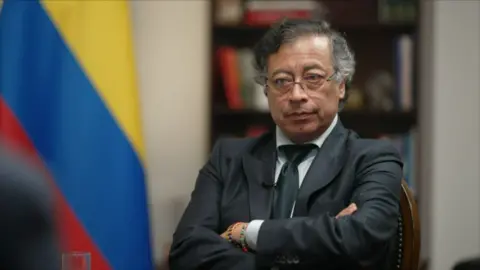Colombia’s President Gustavo Petro has strongly condemned recent US airstrikes on suspected drug-trafficking boats in the Caribbean Sea, describing them as an “act of tyranny” and calling for accountability if Colombian citizens were among those killed.
In an interview with the BBC on Wednesday, Petro said the strikes — launched under President Donald Trump’s administration — violated international law and the principle of proportionality in the use of force.
“Why launch a missile if you could simply stop the boat and arrest the crew? That’s what one would call murder,” Petro said.
The US military has reported targeting fast-moving boats it claims are linked to drug cartels, including Venezuela’s Tren de Aragua gang. According to US officials, the operations are part of efforts to curb the flow of fentanyl and other narcotics into the United States.
Since the strikes began earlier this month, at least 17 people have reportedly been killed, though Washington has released few details about the victims or the legitimacy of the intelligence guiding the operations.
Legal experts, UN officials, and some US lawmakers have raised alarms, warning that the actions could amount to extrajudicial executions in violation of human rights law.
Petro said Colombia has long cooperated with American and international agencies on maritime drug seizures, and stressed that lethal force had never been necessary.
“We have a long history of collaborating on cocaine seizures. No one has ever died before. There is no need to kill anyone,” he said, adding that “anything more than a pistol” in such operations breaches proportionality.
The Colombian leader also accused the Trump administration of humiliating South American nations and seeking dominance.
“We will not bow down to the king,” Petro said. “Trump is the one isolating the United States with his foreign policies.”
When asked about Petro’s remarks, the White House defended the strikes. A spokesperson said President Trump was “prepared to use every element of American power to stop drugs from flooding into our country and to bring those responsible to justice.”
The administration has recently expanded its military presence in the southern Caribbean, deploying thousands of Marines and naval vessels. Trump has also labeled several Latin American drug-trafficking organisations, including Venezuela’s Cartel of the Suns, as terrorist groups.
The exchange underscores Petro’s increasingly combative stance toward Washington. Since returning to office in January, Trump has pursued tougher trade and immigration policies against Latin America while escalating his rhetoric on the drug war.
Petro, for his part, has warned that such policies risk destabilising the region while undermining international law.
With pressure mounting from human rights groups and US lawmakers, the legality of Washington’s new counter-narcotics strategy may soon face international scrutiny.





